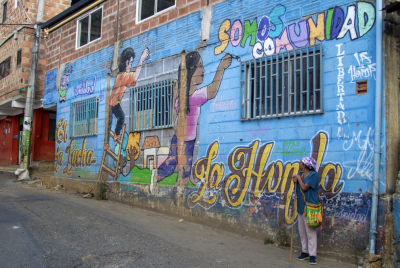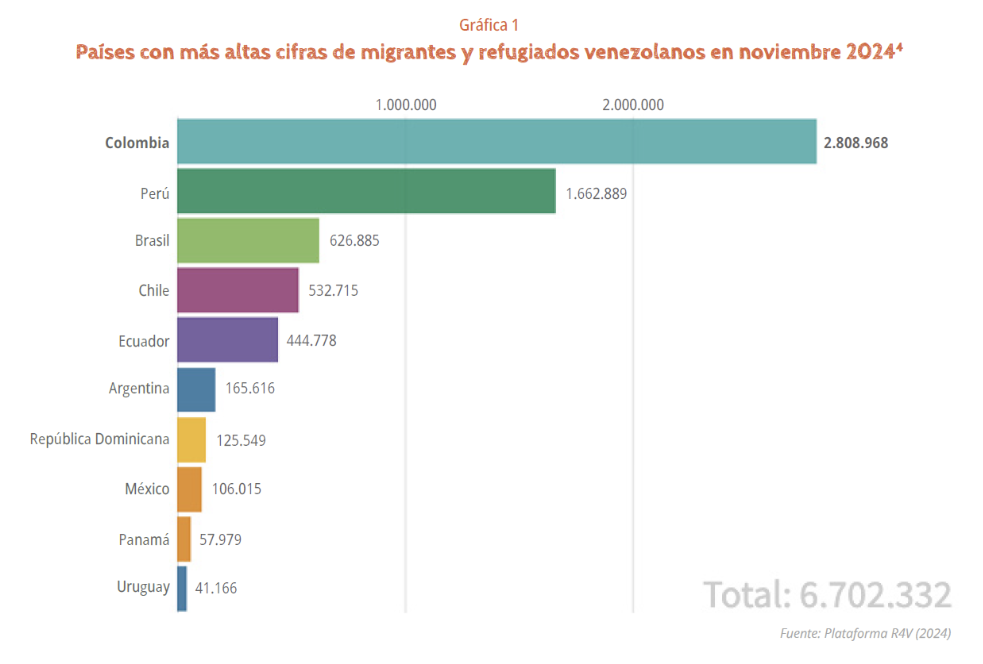
Despite the tone of emergency we see in the news about the number of people migrating to the United States, other countries in Latin America are receiving and resettling the vast majority of people migrating in our hemisphere.
One of the largest migrations in Latin America in recent years is the exodus of Venezuelan people fleeing economic collapse, hyperinflation, and extreme poverty. As the country's economy has unraveled, millions find themselves unable to meet basic needs such as food, medical care, and medicine - prompting large-scale displacement across the region. Since 2018, 1 in 4 Venezuelans have fled their homes.
Due to its geographical proximity, Colombia is the primary destination for Venezuelans. According to a report by our partners, the Franciscan Network for Migrants Red Franciscana para Migrantes (RFM) - Colombia, as of November 2024, 42% of the Venezuelan refugee and migrant population in all Latin America was in Colombia.

To put this in context, as of 2023, 770,000 Venezuelans lived in the United States. And most analysts credit US-imposed economic sanctions as a root cause of Venezuelan migration.
The migratory situation continues to be a major challenge for the Colombian government and society, especially in terms of human rights, social integration, and access to basic services. Colombia holds a dual role as a mass recipient not only of Venezuelan migrants but also of Colombians returning from Venezuela.
In an effort to address these challenges, the Colombian government introduced the Estatuto Temporal de Protección de Migrantes Venezolanos (ETPV) in 2021 - a mass regularization program that has provided over 2.5 million Venezuelans with Temporary Protection Permits (PPT), granting them legal status, work authorization, and access to essential rights like healthcare, education, and employment. However, in May 2023, registration closed for new PPT applicants, excluding recent arrivals and reinforcing conditions of irregularity and vulnerability. According to RFM Colombia, while the ETPV marks a groundbreaking step toward fair migration policies, its long-term impact will hinge on whether it evolves into a permanent migration framework.
Against this backdrop, in 2024, Franciscans International commissioned RFM Colombia to conduct a study on the human rights situation of Venezuelan migrants planning to settle permanently in Colombia and to assess the government's response to this population. The team organized three focus groups in key migration hubs including Armenia, Cali, and Medellín, where Venezuelan migrants shared in-depth accounts of their experiences. These sessions enabled RFM to gather qualitative data to document and analyze potential human rights violations.
RFM Colombia's study found that, despite the progress represented by the Temporary Protection Statute for Venezuelan Migrants (ETPV), multiple institutional, social, and legal barriers remain that prevent effective access to fundamental rights such as health, education, work, and protection from violence.
The study revealed that the dominant narrative in the media and some government discourse continues to associate migration with crime and social burden, fueling discriminatory practices in employment. It also called attention to the untreated mental health crisis among migrants who have experienced the trauma of forced displacement. In addition, RFM highlighted the acute forms of gender-based violence faced by migrant women, including sexual exploitation, workplace harassment, domestic violence, and institutional violence.
What is more, the hostile migration policies of the current US administration have led to a dramatic shift in migration trends since January, resulting in a reverse flow southward. As documented by the RFM team in Panama, and as we observed during the Quixote Center solidarity trip in March 2025, many migrants are leaving in boats from Miramar, Panama and arriving in Necoclí, Colombia. We anticipate that this reverse flow of migration will intensify in the coming months and years with Colombia and Brazil being major recipients of this population.
To respond to these growing challenges and provide urgently needed support to Colombia's migrant population, RFM-Colombia is organizing a national assembly in August as part of its broader capacity-strengthening process. Supported by the Quixote Center, the assembly will bring together volunteer teams from across the country to develop a two-year action plan and concrete follow-up strategies to address the mass influx of migrants. Two Franciscan sisters from Necoclí are joining the assembly to address the reverse-flow arriving in their region from Panama.
This assembly will allow RFM Colombia to strengthen models such as their "communities of life" program to promote dialogue, mutual recognition, and inclusion between migrants and local citizens. It also builds on RFM's recent international advocacy efforts, including their participation in June at the UN Committee on the Rights of Persons with Disabilities (CRPD) in Geneva, where they called attention to the rights of migrants with physical, sensory, cognitive, or psychosocial disabilities, "the invisible within the invisible population". RFM Colombia continues to develop strategies for political advocacy, pushing for inclusive and humane migration policies at both national and international levels.


